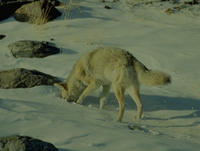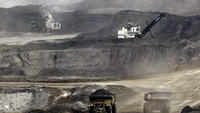-
New rapid diagnostic test for pathogens, contaminants developed
Using nanoscale materials, researchers have developed a single-step method rapidly and accurately to detect viruses, bacteria, and chemical contaminants; the method could be used to detect pathogens and contaminants in biological mixtures such as food, blood, saliva, and urine
-
-
Social identification, not obedience, is the motive for unspeakable acts
What makes soldiers abuse prisoners? How could Nazi officials condemn thousands of Jews to gas chamber deaths? What is going on when underlings help cover up a financial swindle? For half a decade or so, the dominant view – following the famous Milgram experiments – has been that people engage in barbaric acts because they have little insight into what they are doing and conform slavishly to the will of authority; new research suggests that we need to rethink obedience as the standard explanation for why people engage in cruel and brutal behavior
-
-
World’s top high-school chemistry students to compete in the International Chemistry Olympiad
On 20 July, nearly 300 high school students from more than seventy countries will arrive in the Washington, D.C., area to compete in the 44th International Chemistry Olympiad (IChO) at the University of Maryland, College Park
-
-
U.S. launches national corps of STEM teachers
On Tuesday President Barack Obama announced his plan to create a new, national STEM Master Teacher Corps that fosters peer-to-peer professional development; the corps would start with fifty of the nation’s top STEM teachers established in fifty sites and, over four years, expand that core group to 10,000 teachers
-
-
U.S. students' achievements middling

A new study of international and U.S. state trends in student achievement growth shows that the United States is squarely in the middle of a group of forty-nine nations in fourth- and eighth-grade test-score gains in math, reading, and science over the period 1995-2009; that rates of improvement varied among states; Maryland had the steepest achievement growth trend, followed by Florida, Delaware, and Massachusetts
-
-
Studying predator search patterns to improve human searches

The inspiration for the next Google or search-and-rescue drone may spring from a seemingly unlikely source: Watching how animals sniff out food; innovators in everything from robotics to Internet search engines study patterns that animal predators walk while searching for prey; mathematical models which have been used in the past to study these patterns, however, are in need of a little revamping, researchers say — because in the animal kingdom, scent plays a major role in tracking prey
-
-
French students win 2012 International Rocketry Challenge
Lycee Louis Bleriot of France beat out stiff international competition to win the International Rocketry Challenge at the Farnborough International Air Show the other; teams of students 11-18 years old hand-designed, built, and launched rockets to reach exactly 800 feet during a 43- to 47-second flight. The payload, two raw eggs, had to return to the ground by parachute undamaged
-
-
Competition among political forces, not religious fundamentalism, inflames anti-Americanism in the Muslim world

Historically, domestic political divisions within Muslim politics have fallen between secular elite and fundamental Islamic elite factions, with both groups laying claims to anti-American grievances; that competition is most intense not in the most deeply observant Islamic countries, but rather in countries where divisions between secular and religious factions are sharpest; in those countries, competition between political forces — not religious fundamentalism — appears to spark the greatest anti-American sentiment
-
-
Unmanned systems emulate animals’ conditioned fear-response mechanism for self-preservation
When animals in the wild engage in eating or grazing, their eyes, ears, and sense of smell continuously monitor the environment for any sense of danger; researchers developed a similar conditioned fear-response mechanism for unmanned systems
-
-
Studies of nuclear weapons make a contribution to climate science
Nuclear weapons testing may at first glance appear to have little connection with climate change research, but key cold war research laboratories and the science used to track radioactivity and model nuclear bomb blasts have today been repurposed by climate scientists
-
-
Will rising temperatures lead to rising crime rates?
General Strain Theory has become one of the leading explanations for crime, and Emory University’s Professor Robert Agnew, has become its chief architect; he argues that rising temperatures will lead to more strains — increased temperatures, heat waves, natural disasters, serious threats to livelihood (farming, herding, fishing), forced migrations on a massive scale, and social conflicts arising as nations and groups compete for increasingly scarce food, fresh water, and fuel – and more strains invariably lead to rising crime rates
-
-
Emissions from oil sands-derived fuels too varied for uniform low-carbon standards

Policy makers need to be cautious in setting new low-carbon standards for greenhouse gas emissions for oil sands-derived fuels as well as fuels from conventional crude oils; researchers found that lifecycle greenhouse gas (GHG) emissions vary widely across both actual surface mining and in situ oil sands operations and conventional crude cases reported in the scientific literature, depending on individual project operating conditions, technology used, and other factors
-
-
Using cold plasma to fight fires
Traditional fire-suppression technologies focus largely on disrupting the chemical reactions involved in combustion; from a physics perspective, however, flames are cold plasmas; DARPA, the Pentagon’s research arm, theorized that by using physics techniques rather than combustion chemistry, it might be possible to manipulate and extinguish flames
-
-
New international plan to tackle cyber crime, make Internet safer
A new international plan to tackle cyber crime has been launched; the new research roadmap has been developed by leading international cyber security researchers along with industry and government experts, and it aims to help make the Internet of tomorrow a safe and secure platform which is vital for global economic growth and societal development
-
-
Environmental changes lead stressed cows in southern U.S. to produce less milk

Researchers found that the decline in milk production due to climate change will vary across the United States, since there are significant differences in humidity and how much the temperature swings between night and day across the country; for instance, the humidity and hot nights make the Southeast the most unfriendly place in the country for dairy cows
-
More headlines
The long view
A Shining Star in a Contentious Legacy: Could Marty Makary Be the Saving Grace of a Divisive Presidency?
While much of the Trump administration has sparked controversy, the FDA’s consumer-first reforms may be remembered as its brightest legacy. From AI-driven drug reviews to bans on artificial dyes, the FDA’s agenda resonates with the public in ways few Trump-era policies have.
Risk Assessment with Machine Learning
Researchers utilize geological survey data and machine learning algorithms for accurately predicting liquefaction risk in earthquake-prone areas.
Foundation for U.S. Breakthroughs Feels Shakier to Researchers
With each dollar of its grants, the National Institutes of Health —the world’s largest funder of biomedical research —generates, on average, $2.56 worth of economic activity across all 50 states. NIH grants also support more than 400,000 U.S. jobs, and have been a central force in establishing the country’s dominance in medical research. Waves of funding cuts and grant terminations under the second Trump administration are a threat to the U.S. status as driver of scientific progress, and to the nation’s economy.
The True Cost of Abandoning Science
“We now face a choice: to remain at the vanguard of scientific inquiry through sound investment, or to cede our leadership and watch others answer the big questions that have confounded humanity for millennia —and reap the rewards.”
Bookshelf: Smartphones Shape War in Hyperconnected World
The smartphone is helping to shape the conduct and representation of contemporary war. A new book argues that as an operative device, the smartphone is now “being used as a central weapon of war.”
New Approach Detects Adversarial Attacks in Multimodal AI Systems
New vulnerabilities have emerged with the rapid advancement and adoption of multimodal foundational AI models, significantly expanding the potential for cybersecurity attacks. Topological signatures key to revealing attacks, identifying origins of threats.
